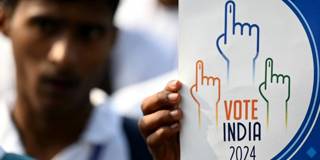SHASHI THAROOR

Among the many issues that will confront the government that emerges from India’s upcoming general election – running from April 19 through June 1 – one of the most important will be what to do about the country’s frayed relationship with its troubled neighbor, Pakistan. The answer may be simple: not much.
Until recently, there was some hope that elections in both countries in the first half of 2024 might create an opportunity for a fresh start. But any optimism about the bilateral relationship’s future quickly dissipated after Pakistan’s controversial February election: with the popular former Prime Minister Imran Khan and his Pakistan Tehreek-e-Insaf party having been barred from running, the new government’s legitimacy is widely challenged.
A weak Pakistani coalition government propped up by the military is unlikely to be able to undertake any bold diplomatic initiative toward India, especially because Khan’s supporters, who consider themselves unfairly deprived of power, are liable to challenge any significant policy change. Under these circumstances, India will probably be inclined to maintain its policy of watchful “benign neglect” toward Pakistan.
As it stands, India and Pakistan maintain diplomatic relations at the charge d’affaires level (a notch below the ambassadorial level), but engage on few issues and speak past each other in the few forums in which they both participate. The South Asian Association for Regional Cooperation has been left moribund by their mutual hostility, having gone years without a meeting.
Moreover, bilateral trade is minimal, and exchanges among ordinary people are limited. Indian citizens struggle to get visas to visit Pakistan, and vice versa. Even in sporting events, the two countries rarely compete with each other outside of international tournaments. In short, India and Pakistan are next-door neighbors who are not on speaking terms – and, in India’s view, that is just fine.
India could not always afford to ignore Pakistan, which was long a source of terrorism directed at India. Most notorious, in November 2008, a terrorist organization from Pakistan, the Lashkar-e-Taiba, carried out a four-day shooting and bombing campaign in Mumbai, killing over 170 people.
The bilateral relationship never recovered. In fact, there have been numerous moments when a thaw seemed likely – for example, during Indian Prime Minister Narendra Modi’s unplanned stopover in Lahore for then-Pakistani Prime Minister Nawaz Sharif’s birthday celebration in 2015. But progress has always been disrupted by another Pakistani-directed terror attack.
As long as Pakistan was unable or unwilling to curb Islamist terrorism from within its borders, India concluded, better bilateral relations would remain elusive. So, in 2019, when Pakistan withdrew its high commissioner from Delhi in protest of Indian policy in Kashmir, India did not resist; on the contrary, it preferred things that way.
Today, India has even less reason to engage with Pakistan. With internal security challenges – especially in its western borderlands of Baluchistan (near Iran) and Khyber Pakhtunkhwa (near Afghanistan) – claiming its attention, Pakistan has little capacity to launch any serious attack on its neighbor. Instead, Pakistan’s military establishment, led by General Asim Munir, has been using those internal security challenges – including those that have arisen directly from groups Pakistan fostered as weapons against India – as a pretext to consolidate its control over the Pakistani state.
It was Munir’s predecessor, General Qamar Jawed Bajwa, who in 2018 engineered the “managed election” of Imran Khan as prime minister. The military was seeking an alternative to the two main political parties – the Pakistan People’s Party and the Pakistan Muslim League – which had alternated in power since the 1970s. (Both had been repeatedly ousted by the military leaders pulling strings behind the scenes.)
But Bajwa backed the wrong horse. Once in power, Khan – a charismatic former cricket star with a playboy image who had transformed himself into a radical Islamist married to a Muslim religious figure – was unwilling to play by the military’s rules. Articulating a fiercely nationalist and Islamist message, and questioning the military’s authority, Khan increasingly asserted his independence – and developed a strong national following.
By April 2022, the military had had enough and arranged Khan’s dismissal. This was not an entirely unpopular action abroad, as Khan had alienated virtually all of Pakistan’s traditional allies. He had celebrated the Taliban’s return to power in Afghanistan, publicly accused the United States of plotting to overthrow him, and met with Russian President Vladimir Putin in Moscow hours after Putin launched Russia’s full-scale invasion of Ukraine. Khan had also antagonized China by disparaging its China-Pakistan Economic Corridor project. And, by aligning Pakistan with Turkey and Malaysia on some issues, he was seen as undermining Saudi Arabia’s leadership of the Islamic world.
In removing Khan, the military seemed to be attempting to restore the old Pakistan: a military-controlled state with a democratic façade that maintains close relations with both the US (on which it depends for military assistance) and China (which provides mostly civilian aid), while seeking to profit from their rivalry. The military also seeks to revive Pakistan’s old role in the Islamic world as a moderate Saudi tributary and restore its carefully cultivated image as the last defense against an extreme Islamist takeover.
But the world has changed since Pakistan last played such games. The US is much less willing to turn a blind eye to Pakistani duplicity than it used to be. Its troops are no longer in Afghanistan, after all, and Pakistan – which is increasingly a Chinese vassal – is not nearly as useful a partner as India in America’s rivalry against China. As for Saudi Arabia, it has embarked upon a dizzying modernization program that is altering its identity as a bastion of Islamic conservatism.
So, India can afford to look beyond Pakistan. And with an economy ten times larger than its neighbor’s, as well as broad global ambitions, it is unlikely to rethink this policy any time soon.
No comments:
Post a Comment